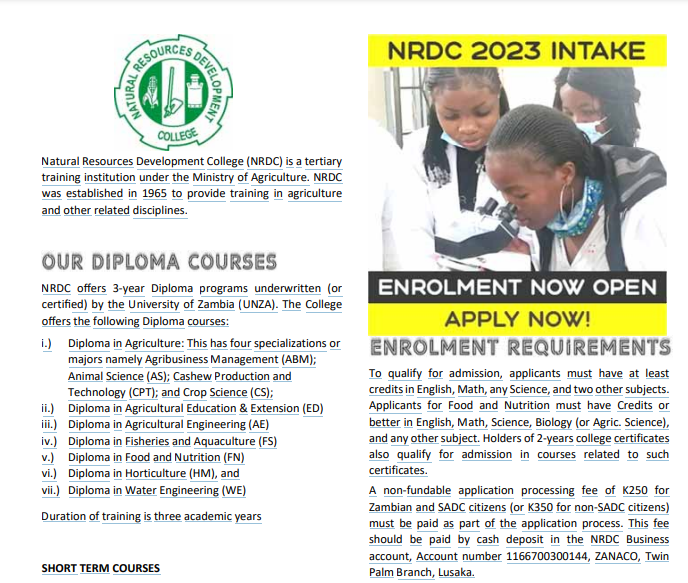Nrdc courses and fees; If you have a passion for agriculture and related disciplines, the Natural Resources Development College (NRDC) in Zambia might be the perfect place for you to nurture your interests.
NRDC offers a range of comprehensive three-year diploma programs and short-term courses that cover a variety of agricultural and related fields.
In this article, we will explore the diverse diploma courses available at NRDC, the admission requirements, and the fee structure for both full-time and distance learning modes.

NRDC Diploma Courses
NRDC’s diploma programs are designed to provide students with a strong foundation in various aspects of agriculture and related disciplines. These programs include:
- Diploma in Agriculture: This program offers four specializations, allowing students to choose their area of expertise. The specializations are:
- Agribusiness Management (ABM)
- Animal Science (AS)
- Cashew Production and Technology (CPT)
- Crop Science (CS)
- Diploma in Agricultural Education & Extension (ED): This program focuses on equipping students with the skills needed for agricultural education and extension services.
- Diploma in Agricultural Engineering (AE): This program provides students with knowledge in agricultural engineering, which is essential for modern farming practices.
- Diploma in Fisheries and Aquaculture (FS): Students in this program learn about fisheries and aquaculture practices, contributing to sustainable aquatic resource management.
- Diploma in Food and Nutrition (FN): This program concentrates on food and nutrition, emphasizing the importance of a balanced diet.
- Diploma in Horticulture (HM): Horticulture enthusiasts can specialize in this program, gaining expertise in the cultivation of fruits, vegetables, and ornamental plants.
- Diploma in Water Engineering (WE): This program focuses on water resource management and engineering, which are essential for agricultural practices involving irrigation and water supply.
Each of these diploma programs has a duration of three academic years, providing students with in-depth knowledge and practical skills in their chosen field of study.
Short-Term Courses
In addition to its diploma programs, NRDC also offers short-term tailor-made courses upon request from interested organizations. These courses are designed to meet specific training needs and can vary in duration and content.
Whether you’re looking to enhance your skills or explore a specific aspect of agriculture, NRDC’s short-term courses provide valuable learning opportunities.
Admission Requirements
To embark on your educational journey at NRDC, you need to meet certain academic requirements. In general, applicants should have at least credits in English, Math, any Science subject, and two other subjects.
However, some programs have specific subject requirements. For example, applicants to the Food and Nutrition program should have credits or better in English, Math, Science, Biology (or Agric. Science), and any other subject.
If you hold a 2-year college certificate related to your desired program, you also qualify for admission.
As part of the application process, there is a non-refundable application processing fee. Zambian and SADC citizens are required to pay K250, while non-SADC citizens should pay K350.
This fee should be paid through a cash deposit in the NRDC Business account, Account number 1166700300144, ZANACO, Twin Palm Branch, Lusaka.
Application forms for the 2023 intake can be obtained from the NRDC campus in Lusaka or downloaded from the college’s website at www.nrdc.biz.
It’s important to note that the 2023 intakes will commence on 2nd January 2023 for Distance Learning and 20th February 2023 for full-time programs (Regular and Parallel).
Admission is granted on a first-come, first-serve basis. The application deadlines are 31st December 2022 for Distance Learning and 17th February 2023 for Full-time programs.
NRDC Fee Structure
Understanding the fee structure is crucial when planning your educational journey. NRDC offers two modes of learning: Full-Time and Distance Learning. Let’s delve into the fee structure for each mode:
Full-Time Mode
Full-time students at NRDC have two categories to choose from: Regular Program and Parallel Program.
Regular Program
- Boarders: New students boarding in the 2023 academic year will pay K6,770 per semester. This fee covers tuition and accommodation. However, students are responsible for providing their own meals.
- Day Scholars: Day scholars will pay K4,820 per semester.
Parallel Program
First-year Parallel program students for 2023 will pay K4,820 per semester.
Distance Learning Mode
Distance Learning offers an alternative to full-time study, focusing on self-study with materials provided by the college. However, students are required to attend a 4-week residential school in each semester.
During this period, students participate in practical sessions, assessments, and examinations.
In 2023, new students reporting as boarders will pay K4,630 per semester, covering tuition and accommodation without meals. For those attending the residential school as day scholars, the fee will be K3,880 per semester, covering tuition only.
Please keep in mind that fees are subject to change, so it’s essential to verify the current fee structure with NRDC before applying for admission.
In conclusion, NRDC offers a wide range of diploma programs and short-term courses for individuals passionate about agriculture and related disciplines.
Whether you aspire to be an agribusiness expert, an agricultural engineer, or a horticulturist, NRDC provides the educational foundation and practical skills you need to succeed.
Additionally, with both full-time and distance learning options, NRDC caters to a diverse range of students.
If you’re considering NRDC for your agricultural education, be sure to review the admission requirements, application deadlines, and fee structure to plan your educational journey effectively.
NRDC is committed to nurturing your passion for agriculture and helping you cultivate a bright future in this vital field.
Related post: